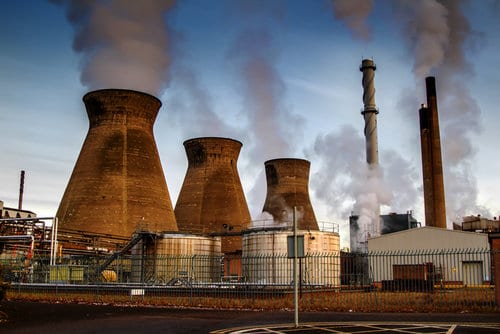Energy Minister Amber Rudd delivers speech calling for an end to ‘outdated’ energy source, with natural gas and nuclear power to be ramped up to plug the power gap.

The U.K. will phase out all of its remaining coal-fired power stations by 2025, Energy Minister Amber Rudd has confirmed in a speech delivered at the Institution of Civil Engineers.
The ‘aging’, ‘dirty’ and ‘outdated’ power source will no longer form part of the U.K.’s energy mix within a decade, with plants unequipped with carbon-capture and storage technologies to be restricted from 2023 with an eventual complete phase-out by 2025.
Rudd remarked in her speech that “It cannot be satisfactory for an advanced economy like the U.K. to be relying on polluting, carbon-intensive 50-year-old coal-fired power stations.”
However, with coal accounting for 28% of the U.K.’s energy mix, this is not the opportunity for renewable energy as it might have been, with Rudd stating earlier this week that the Department of Energy and Climate Change’s (DECC) main priority is to ‘keep the lights on’ and end the ‘pursuit of green energy at all costs’.
Rudd has outlined that natural gas and nuclear power will be increased to plug the gap left by coal’s phasing out, and made no mention of renewables such as solar or wind power in her speech. “Gas is central to our energy secure future,” she said. “In the next 10 years, it is imperative that we get new gas-fired power stations built.”
The U.K.’s legally binding emission reduction target is 80% below 1990 levels by 2050, and Rudd said that one of the “greatest and most cost-effective contributions” the U.K. can make towards cutting emissions is to replace coal with gas. Natural gas is around 50% less polluting per MWh of power as coal, but is still a finite – albeit increasingly affordable – fossil fuel.
Rudd was also compelled to reiterate DECC’s belief that nuclear power is a safe and clean power source for Britain. The controversial Hinkley Point C nuclear plant was given the green-light last month during a state visit by Chinese premier Xi Jinping. China will build and operate the plant alongside French firm, EDF.
While the decision to phase out coal has been welcomed by environmentalists, Rudd’s refusal to offer greater support or words of encouragement to renewables was roundly criticized.
“Switiching from coal to gas is like an alcoholic switching from two bottles of whisky a day to two bottles of port,” said Friends of the Earth senior energy campaigner Simon Bullock.
Paul Barwell, the Solar Trade Association’s (STA) CEO, said that replacing fossil with fossil makes little sense, stressing: “Phasing out coal power is of course good news and was expected. However, it makes little sense to replace fossil coal only with fossil gas.”
Barwell added that both solar and gas require government subsidy support of similar levels, but stated that solar has the “bonus of zero carbon emissions, future price certainty and no dependency on imports from unstable countries”.
The U.K. government has recently scaled-back subsidies for solar power by as much as 87% in terms of the feed-in tariff (FIT), and has also ended the renewable obligation (RO) scheme for solar a year early. This withdrawal of support may leave the sector stranded in limbo, unable to maintain the growth that has seen solar rise from 0% of the U.K.’s energy mix to 2% in just five years.
“Solar could get to 5% by 2020 with very little extra support,” Barwell said. “There is plenty of room to include solar alongside gas and nuclear in the coal phase out.”
Solar’s popularity among the public has been well publicized in recent weeks as the industry has fought to compel the government to rethink its stance on renewables. “The level playing field the Energy Minister wants to see in energy is very welcome, and if implemented that should mean solar is squarely back in the game,” Barwell added. “However, fossil fuel incentives currently distort the market.”
The Renewable Energy Association (REA) said that the government’s “long-awaited policy reset” will fail to decarbonize the U.K.’s energy future in the most cost-effective way. A statement issued by the REA said that Rudd’s speech will do nothing to “reassure investors in the energy market and their confidence in the the government, and will do nothing to save industries such as solar, anaerobic digestion and biomass, which have been left reeling over successive damaging policy interventions.”
James Court, the REA’s head of policy and external affairs, said that Rudd’s actions – through supporting higher cost technologies such as nuclear at the expense of renewables – will mean consumers will end up paying more on their energy bills.
“We need government intervention to build any new energy infrastructure the U.K. needs, but the announcements today will mean subsidizing too much fossil fuel, for too long,” Court said.
Recent analysis of energy prices in the U.K. has found that solar PV can be competitively priced at £79 MWh, with gas coming in at between £65.72/MWh to build new generation. Solar costs are falling, and gas costs may rise.
“In the lead up to the crucial climate talks in Paris which Amber Rudd has stated she wants the UK to be leaders, but the rest of the world will see a country prepared to subsidise gas whilst simultaneously removing support to renewables,” added REA chief executive Nina Skorupska.
Source: PV Magazine. Reproduced with permission.









